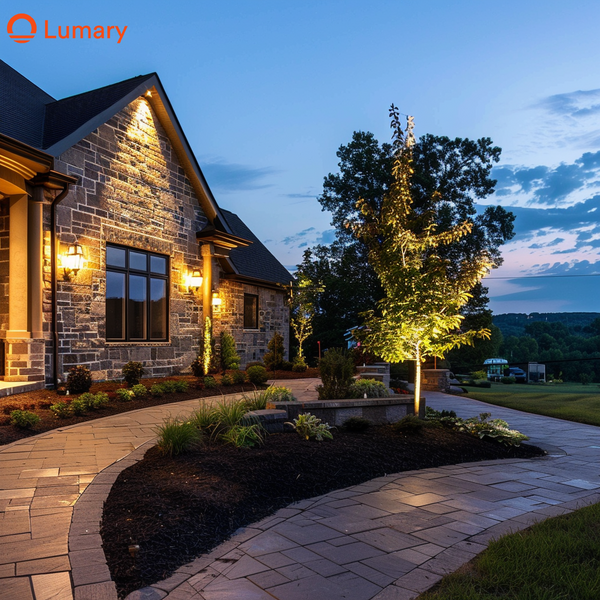Outdoor landscape lighting plays a crucial role in enhancing the aesthetics and functionality of your outdoor space. By strategically illuminating key areas, you not only elevate the beauty of your property but also boost its security and value. The installation process, though intricate, promises rewarding outcomes.Understanding the significance of proper outdoor landscape lighting is essential for creating a welcoming ambiance and ensuring safety around your home. Before delving into the installation details, familiarize yourself with the tools and materials required to kickstart this transformative project.

Planning Your Outdoor Lighting
Assessing Your Landscape
When assessing your landscape, it is crucial to identify key areas that will benefit from outdoor landscape lighting. By pinpointing specific spots, such as garden beds or architectural features, you can create a captivating visual impact throughout your outdoor space. Each light should serve a distinct purpose, whether it is to highlight a focal point or provide ambient illumination for gatherings.
Designing a Lighting Plan
In designing a lighting plan, start by sketching a layout of your property to determine the optimal placement of each fixture. Consider the natural flow of your landscape and how lighting can enhance different elements during both day and night. Choosing the right fixtures is essential; opt for durable LED lights that offer longevity and energy efficiency.
Calculating Power Requirements
Understanding the voltage and wattage needed for your outdoor landscape lighting is fundamental in ensuring proper functionality. Calculate the power requirements based on the total number of fixtures and their individual power consumption. It is vital to ensure compatibility with your power source to prevent any electrical issues down the line.
Gathering Tools and Materials
Essential Tools
Wire cutters and strippers
To effectively handle the electrical components, wire cutters and strippers are essential tools. These tools enable precise cutting and stripping of wires, ensuring a secure connection for your landscape lighting system.
Screwdrivers and drills
Screwdrivers and drills play a vital role in securing fixtures and setting up the transformer. With the right screwdriver, you can easily fasten screws to keep light fixtures in place. Drills are necessary for creating holes or driving screws into tougher surfaces for stable installation.
Necessary Materials
Light fixtures and bulbs
Selecting the appropriate light fixtures and bulbs is crucial for achieving the desired lighting effect. Opt for durable fixtures that complement your outdoor aesthetics while providing adequate illumination. LED bulbs are energy-efficient options that offer longevity and brightness.
Cables and connectors
Cables and connectors are the backbone of your landscape lighting system, facilitating the flow of electricity to illuminate your outdoor space. Ensure you have sufficient cables to connect all fixtures while using quality connectors to establish secure electrical connections throughout the setup process.
Installation Process
Setting Up the Transformer
Selecting an Ideal Location
To establish a sturdy foundation for your outdoor landscape lighting system, carefully choose a location for the transformer. Opt for a spot that is easily accessible yet discreet to ensure seamless functionality without compromising the visual appeal of your outdoor space.
Connecting to the Power Source
Once you have identified the optimal location, proceed to connect the transformer to the power source. Ensure a secure and stable connection by following manufacturer guidelines and local electrical codes. This step is crucial in powering your lights efficiently and safely.
Laying Out the Cables
Measuring and Cutting the Cables
Precision is key when measuring and cutting the cables for your landscape lighting setup. Use appropriate tools to achieve accurate lengths, allowing for seamless connection between fixtures. Remember, precise measurements contribute to a well-organized and visually appealing installation.
Safely Burying the Cables
Prioritize safety by burying the cables at least six inches below the surface. This depth helps prevent accidental damage while ensuring a clean and unobtrusive look for your outdoor lighting system. Securely burying the cables also minimizes tripping hazards and protects them from external elements.
Installing the Light Fixtures
Placing Fixtures Strategically
Strategic placement of light fixtures is essential for achieving optimal illumination throughout your outdoor space. Consider factors such as focal points, pathways, and landscaping features when positioning each fixture. A well-thought-out placement enhances both aesthetics and functionality.
Securing Fixtures Effectively
To guarantee long-term stability, secure each fixture firmly in place using appropriate mounting hardware. Whether attaching lights to walls, stakes, or other surfaces, ensure they are resistant to environmental factors like wind or rain. Properly secured fixtures maintain consistent lighting quality over time.
Making Electrical Connections
Utilizing twist-on style connectors
-
Begin by utilizing twist-on style connectors to establish secure electrical connections for your landscape lighting system.
-
Ensure a tight and reliable connection by twisting the wires together before attaching the connector, guaranteeing proper functionality of the entire setup.
Attaching wires to the transformer
-
Connect the wires from your light fixtures to the transformer, ensuring each wire is correctly matched and securely fastened.
-
Follow the manufacturer's guidelines for proper attachment, maintaining a neat and organized layout for efficient power distribution throughout your outdoor lighting system.
-
Highlight the importance of a well-executed lighting plan to elevate your outdoor space's aesthetics and security.
-
Emphasize the transformative benefits of properly installed outdoor landscape lighting, enhancing both visual appeal and property value.
-
Encourage readers to embark on this DIY project, leveraging expert tips and resources for a successful outcome.
-
Remember, networking with professionals in the lighting design industry can provide valuable insights for future projects.
















